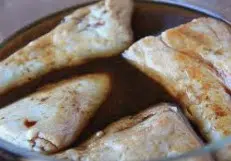The first thing we are going to do before entering fully into the meaning of the term maceration is to know its etymological origin. In this case, we can establish that it derives from Latin, exactly from "maceratio", which is the result of the sum of two clearly delimited lexical components:
-The verb "macerare", which can be translated as "macerate".
-The suffix "-cion", which is used to indicate "action and effect."
The concept is used to name the process and consequence of maceration : leaving a solid submerged in a liquid with the aim of softening it or separating its soluble elements.
 Maceration takes place in different contexts. The extracting substance can be water , an oil , an alcohol or a vinegar , to name a few possibilities. The procedure, in turn, can be carried out hot or cold .
Maceration takes place in different contexts. The extracting substance can be water , an oil , an alcohol or a vinegar , to name a few possibilities. The procedure, in turn, can be carried out hot or cold .
Gastronomy usually uses cold maceration to soften , aromatize and flavor different products or to improve their conservation. A dry or raw food can be macerated in oil, liquor or wine, for example. Fruit maceration, meanwhile, is common for making jams .
With maceration, a transfer of properties can be achieved. If cherries are macerated in whiskey or strawberries in vodka, to name two possibilities, the fruits will take on the flavor of the alcoholic beverage and vice versa.
Meat is one of the foods that is most often marinated in kitchens. And thanks to this process, it is made more tender, can change texture, can have other nuances of flavors and is easier to eat.
Precisely for these reasons, it is common to marinate harder or stronger-flavored meats such as beef or even lamb.
In these cases, you can resort to carrying out the maceration process using products such as lemon juice, wine, vinegar, olive oil, soy sauce and even yogurt.
In the same way, we cannot ignore that, when preparing olive oil to marinate different foods, different plants or spices are usually used. We are referring to some such as rosemary, lavender, thyme or calendula, for example. These can also be used to do the same process with other oils such as almond oil, rice oil and even soybean or sunflower oil.
The maceration of wine , on the other hand, is necessary for the liquid parts and the solid parts to exchange compounds. This is how new flavors are generated. This step in the production process is carried out when the must does not yet contain alcohols nor has it fermented: it is the mixture of the grape juice with the solids of the fruit.
When producing beer, maceration is also used. Malted cereals are combined with hot water and the starch is transformed into maltose.
Finally, in the production of perfumes , maceration in alcohol was usually used. The technique consisted of submerging the petals of flowers such as jasmine or orange blossom in ethanol and distilled water for several weeks.
